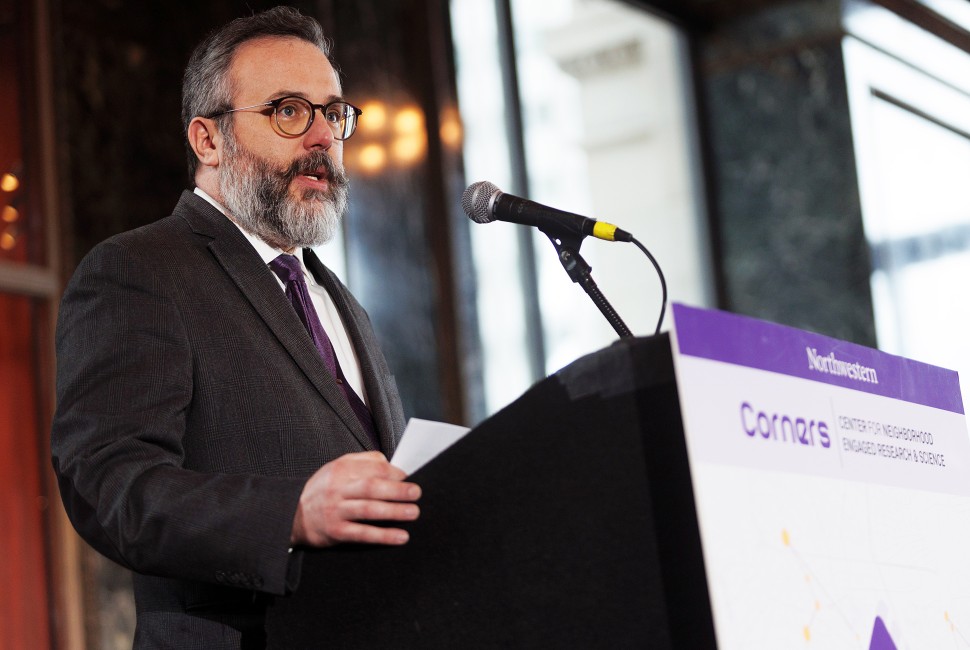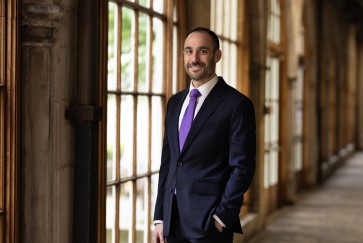Sociologist Andrew Papachristos will become Northwestern University’s new director of the Institute for Policy Research (IPR) and the John G. Searle Professor of Sociology, effective Sept. 1.
“We are extremely pleased that Andrew Papachristos will bring his exemplary leadership to IPR, a flagship research institute where he already has made a major contribution as a faculty member pursuing important research with societal benefit,” said Provost Kathleen Hagerty.
Papachristos assumes a leadership role previously held by Diane Whitmore Schanzenbach, who stepped down to become senior advisor to the president for academic excellence and associate provost at the University of Florida.
Papachristos is a renowned scholar whose research focus includes leveraging network science to identify dynamics associated with gun violence, crime, policing and urban neighborhoods. A sought-after expert with the ability to translate his research to make it accessible for various audiences, Papachristos is faculty director of CORNERS: The Center for Neighborhood Engaged Research and Science, affiliated with IPR. The center’s research projects are built around community partnerships that seek to improve neighborhood health and safety and reduce inequities. Papachristos joined Northwestern in 2018, after serving on the faculties of Yale University and the University of Massachusetts Amherst. He earned his doctorate in sociology and master’s degree in the social sciences from the University of Chicago.
“I am honored and excited to take on this role at IPR, which is truly a unique place that brings together expertise from across the University,” said Papachristos. He added that the Institute’s prestige and reputation for vigorous interdisciplinary research is uncommon — and one of the reasons he was attracted to Northwestern. “I’m a nerdy scientist, but also a committed community partner. My underlying goal involves pursuing research projects that can have an impact on making neighborhoods safer. IPR is the perfect home for research that is both methodologically rigorous and oriented toward real-world solutions.”
Launched in 1968, IPR is one of Northwestern’s approximately 35 University-wide research institutes and centers that harness faculty knowledge from across schools. Its mission is to advance and disseminate world-class social science research on major policy issues, such as poverty, race and inequality, education, urban policy and development and more.
Papachristos praised his predecessor Schanzenbach for elevating IPR’s national profile and building a research environment whose infrastructure encourages cross-field engagement.
“Diane has left us such a great team and framework to build on,” he said. “Her legacy will have a long-term impact for IPR.”
Papachristos sees additional potential to increase IPR’s status as a vigorous policy incubator, one that actively engages with government stakeholders at the city, county and state levels. As an example, he cites IPR COVID-19 research that exerted near-real-time impact during the global health pandemic. The Institute already is making a broad impact, he said, “amplifying good work to make it even better,” with both younger and more experienced faculty collaborating enthusiastically to support one another’s success. He is passionate about helping all IPR faculty thrive, particularly in creating opportunities for junior colleagues and students to achieve excellence.
“Andy is an engaged scholar who understands the importance of applying rigorous research insights to some of our most pressing societal challenges,” said Milan Mrksich, vice president for research. “He’s bold and determined to create collaborations that bridge theory and practice to make a real difference in people’s lives. He is also committed to supporting the success of his colleagues at all levels of their career. I’m confident his leadership will further elevate IPR as a home for some of the very best policy research anywhere.”
Matt Golosinski is director of communications in the Office for Research.


